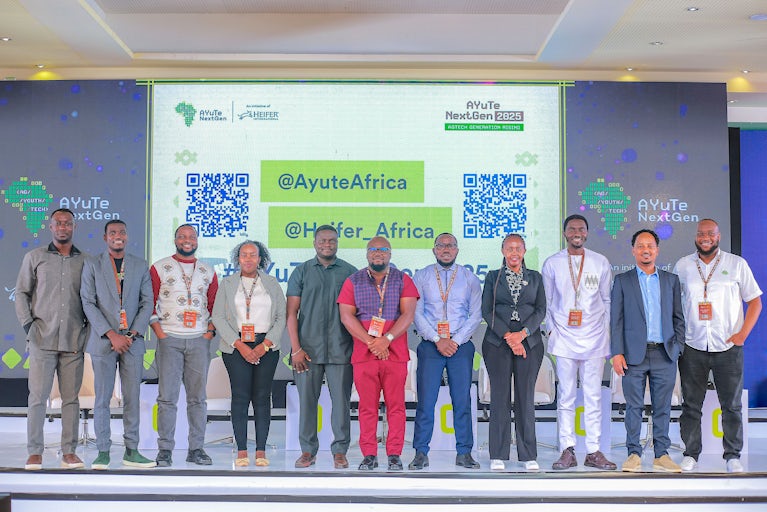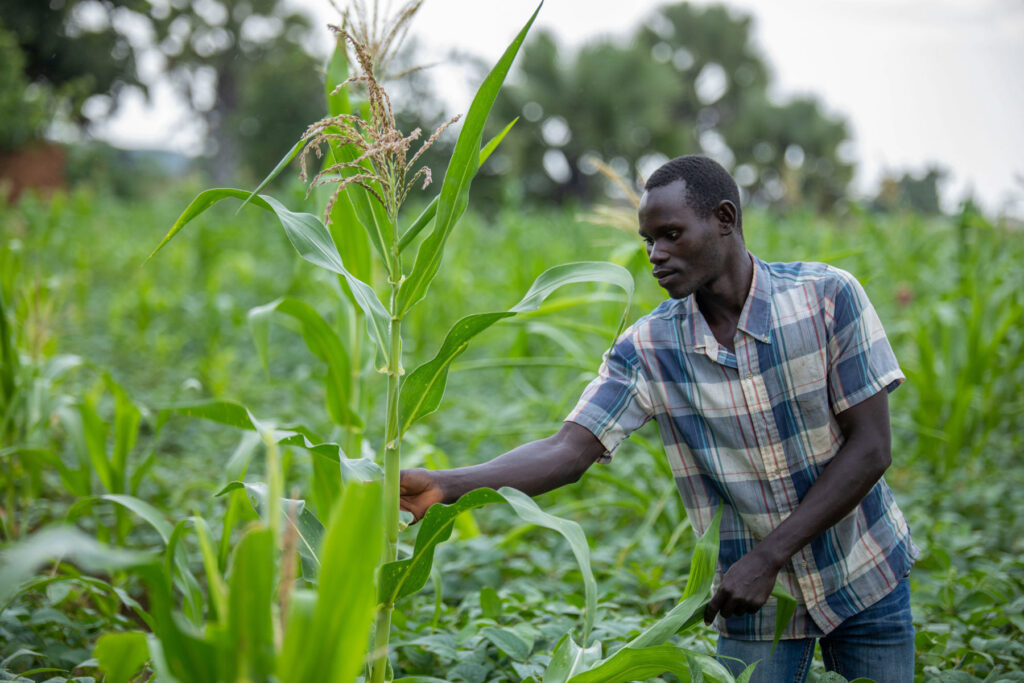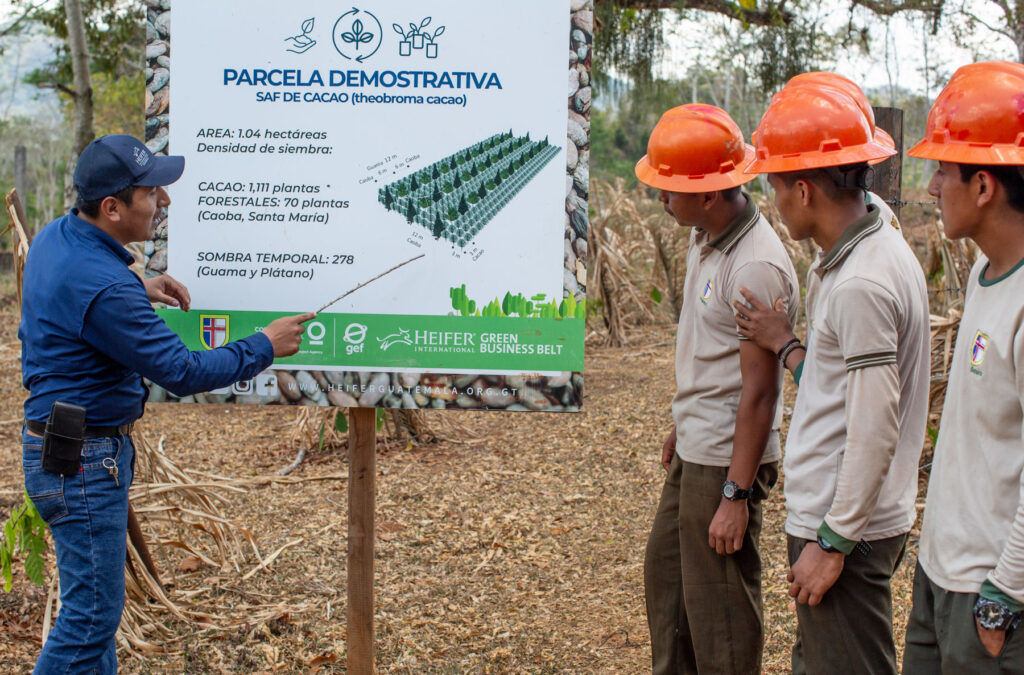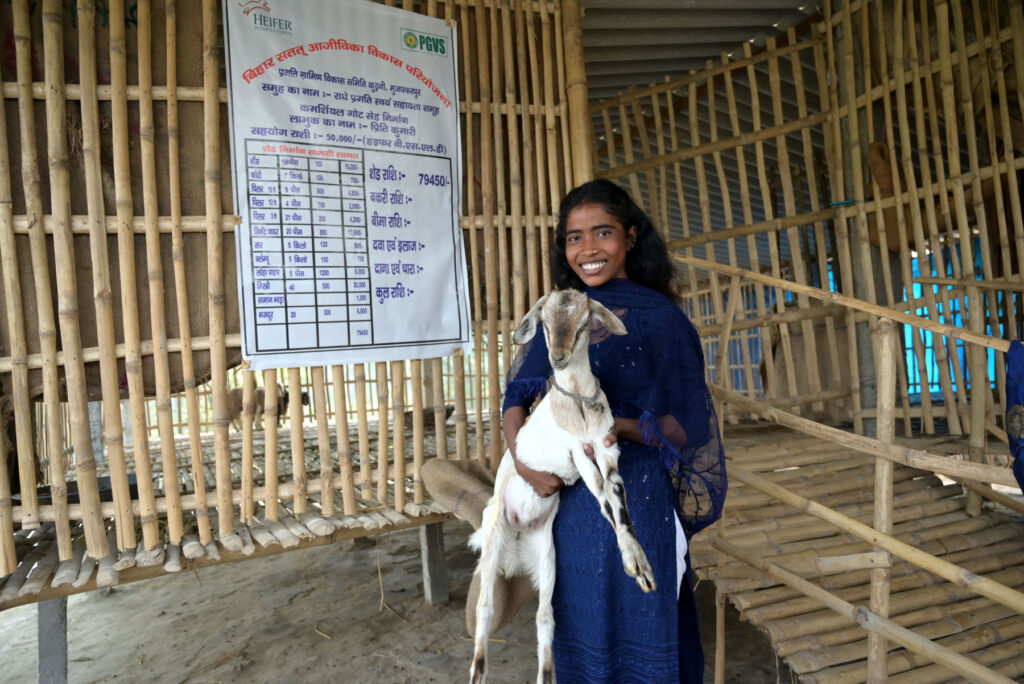
Young Innovators Lead Africa’s Food Systems at AYuTe NextGen 2025
By Heifer International | August 12, 2025
Across the globe, young people have a powerful opportunity to reimagine agriculture not just as a way to grow food, but as a path to innovation, income and community resilience. In rural economies, where farming often shapes daily life, many youth already work the soil but face little access to land, training or financial support. With the right investment, they can turn agriculture into a dynamic, future-focused career — one that feeds families and drives rural prosperity. At Heifer, we believe in the potential of young people to lead, to build and to grow a world where farming offers purpose and a sustainable future.

While much scrutiny is placed on agriculture as an aging industry — the average age of farmers in the United States and Africa is reported to be around 60 — the role of youth in agriculture is much more significant than filling the boots of the current generation of farmers.
The world today hosts a massive population of 1.2 billion young people between the ages of 15 and 24 — and that number continues to rise. According to the Food and Agriculture Organization of the United Nations, nearly 85 percent of young people live in developing countries, particularly in rural areas of sub-Saharan Africa and South-Central and Southeast Asia, where agriculture is often the primary — or only — source of income. Rural youth, as identified by the International Fund for Agricultural Development, already spend half or more of their working time on farming activities.
The World Bank states that 80 percent of the world’s rural poor earn a living through farming, and the sector employs half the rural population of the entire continent of Africa. Despite the prevalence of agriculture, most smallholder farmers live in poverty — operating crop and livestock farms that aren’t as productive as they could be — and miss out on critical opportunities to contribute to their larger food systems.
Agriculture offers unique opportunities for youth to grow more food, transform local food systems and build economies that lift entire communities out of poverty. Expansion of the agriculture sector can boost the incomes of poor families two to four times more effectively than other industries, and two out of three young people who live outside urban areas in developing countries live in areas with the most agroecological potential.
“There is arable land. There is a growing middle class. There is a growing market,” said Adesuwa Ifedi, Heifer International’s senior vice president of Africa programs. “You actually have a market that can sustainably provide jobs across the value chain. … We now need to unlock the potential of the agricultural sector.”

The International Labour Organization reports that while youth unemployment has declined globally, young people remain disproportionately trapped in vulnerable, low-paying or insecure work. “In Africa especially, which boasts the globe’s youngest population, two-thirds of youth are unemployed or working in vulnerable, low-paying positions,” Ifedi said.
“We now need to unlock the potential of the agricultural sector.” —Adesuwa Ifedi
“We definitely know that we are currently not able to provide enough jobs for the young people that we have in our continent,” Ifedi said. “Our innovative thinking is going [to be] around job creation in sectors where these youth could be absorbed.”
Agriculture is the backbone of the economy in many places, totaling 25 percent or more of GDP in several low- and middle-income countries. Engaging youth participation in agriculture — an available, opportune and essential sector for growth — is critical to strengthening local food systems, feeding communities and providing gainful employment opportunities for the world’s booming youth population.
Despite its challenges, “agriculture still remains the biggest platform for job creation,” Ifedi said.
While agriculture can and does have a positive effect in many countries, it remains unattractive to young people. Key challenges include limited access to land, low wages and unclear career opportunities in the agriculture industry. Farmers across the globe regularly confront issues such as climate change, pests and invasive species, outdated farming practices and limited access to new technologies, all of which hinder productivity and income generation.
Research from Heifer International, which includes input from nearly 30,000 young Africans and hundreds of farmers and farm organizations in Africa, identifies additional challenges preventing youth from fully engaging in farming, most notably lack of financing, land, markets and training.
These limitations have fueled a generational disinterest in farming, with many young people viewing it as an unstable livelihood and turning instead toward urban centers to find opportunities. Attracting young people to the sector will require new tools, new perceptions and real-world incentives.
Agriculture is “where the young people in Africa don’t want to go to,” Ifedi said. “That’s where their parents don’t want them to go, because the … impression that we have about agriculture, because of the fact that it’s not driven by technology, is that [it] is not aspirational for the youth.”

Heifer’s research also shows that young people can be encouraged to participate in agriculture with the right support and that, despite their skepticism, many do consider it an accessible livelihood important to a nation’s development. Technology can strengthen the way young people view agriculture and help farmers improve productivity and their ability to earn a living income.
“Technology is how we can leapfrog,” Ifedi said. “Technology is how we can transform the way the agricultural sector is perceived by the average young African [and] begin to open up opportunities where we did not realize that we have opportunities before.”
Yet, many smallholder farmers struggle with low tech adoption, which contributes to low output. Of the youth surveyed for Heifer’s report who are involved in agriculture, only 23 percent use any form of technology such as an app, SMS, website or software. However, young people and smallholder farmers also indicated they would embrace technology if the tools were affordable and they could receive training on how to use them.
While digital literacy for rural farmers must remain a consideration, the World Bank has reported that technology has “significant potential to improve efficiency, equity and environmental sustainability in the food system.” And, where it is possible, we are already seeing smallholder farmers use digital tools to revolutionize their work around the world.
“At every point, every problem being addressed through technology and innovation is a whole new opportunity for jobs to be created.” —Adesuwa Ifedi
In Africa, for example, Heifer partners with Hello Tractor to connect smallholder farmers in Nigeria, Kenya and Uganda with affordable mechanization through a mobile app. Farmers can book tractors on demand, boosting yields, reducing labor time and creating jobs for youth as operators and technicians. Through the MADE Alliance, farmers in Kenya, Tanzania and Nigeria are also using mobile payment systems that cut out middlemen, reduce payment delays and guarantee more transparent, timely income.
Heifer’s report on youth in agriculture also uncovered an innovative spirit at play in Africa, with young entrepreneurs tapping tech like artificial intelligence, remote sensing, virtual reality, drone technology and a variety of precision tools to provide services to smallholder farmers.
“I believe that innovation coming in to create opportunities to address all of this is really where the transformation for Africa will begin,” Ifedi said. “And at every point, every problem being addressed through technology and innovation is a whole new … opportunity for jobs to be created for young Africans.”

Heifer’s mission to end hunger and poverty while caring for the Earth is built on helping smallholder farmers grow more food, earn a living income and contribute to their economies. Youth in agriculture are an essential part of this vision.
Providing young people with the support they need to innovate and overcome barriers is key to repairing food systems, reducing hunger and unemployment and securing sustainable, promising futures for communities around the world.
“I think [through] supporting with financing that is required for the youth, the training that is required, and enabling the integration of technology to unlock opportunities, there is enough to sustain job creation for young Africans, [and] to also empower our smallholder farmers to ensure that they are able to reach a living income and earn a dignified living for themselves and for their families,” Ifedi said.
Ifedi added that the opportunities aren’t limited to the farm level. We can unleash the possibilities and employ youth across the value chain, including in processing, transportation and equipment maintenance.
We’re talking about “the ability to rise beyond the conventional way to solve problems, creating new ways to solve those problems that also create new jobs,” Ifedi said.
Heifer’s research will support this effort, informing investments in advanced technologies to accelerate farming productivity and business growth in Africa, and helping guide programs that can involve youth in building safe, locally led food systems and farming economies in the region. Heifer International also awards up to $1.5 million annually through the AYuTe Africa Challenge, a continent-wide competition supporting young agritech entrepreneurs with funding, mentorship and tools to scale innovations that benefit smallholder farmers.
“What we’re trying to do here in Heifer through our AYuTE program is to create jobs for the future in [the] agriculture sector,” Ifedi said. “There’s a lot of talk about what will happen in the next 10 years in the world and the next 20 years. Agriculture will always be here. …. Agriculture can be a job for the future as long as we are thinking creatively.”
Cart is empty
Success!
Please be patient while we send you to a confirmation page.
We are unable to process your request. Please try again, or view common solutions on our help page. You can also contact our Donor Services team at 855.9HUNGER (855.948.6437).
Covering the transaction fee helps offset processing and administrative fees that we incur through taking payments online. Covering the transaction fee for each payment helps offset processing and administrative fees that we incur through taking payments online. Covering the transaction fee for each payment helps offset processing and administrative fees that we incur through taking payments online.
Success!
Please be patient while we send you to a confirmation page.
We are unable to process your request. Please try again, or view common solutions on our help page. You can also contact our Donor Services team at 855.9HUNGER (855.948.6437).
When you donate a gift to someone, you'll have the option to create a free card after your donation is complete.

A FREE gift will be sent to supporters who choose to give a monthly gift.
Covering the transaction fee helps offset processing and administrative fees that we incur through taking payments online. Covering the transaction fee for each payment helps offset processing and administrative fees that we incur through taking payments online. Covering the transaction fee for each payment helps offset processing and administrative fees that we incur through taking payments online.

A FREE gift will be sent to supporters who choose to give a monthly gift.